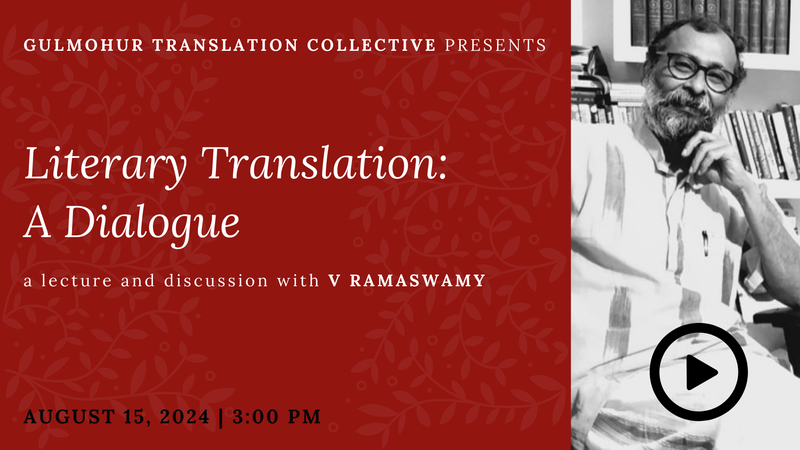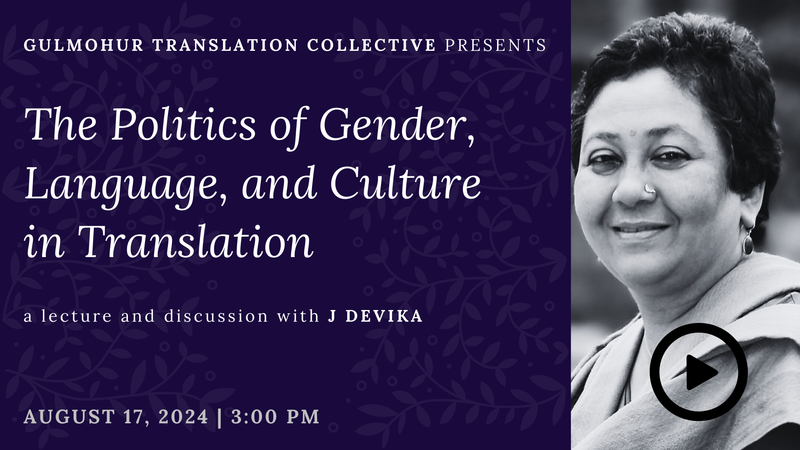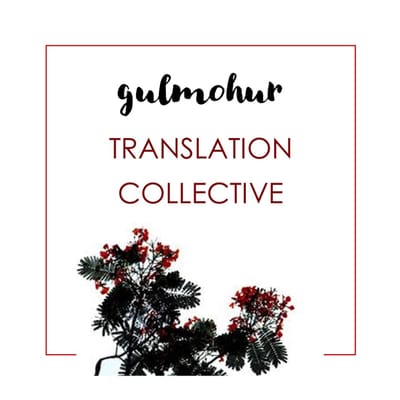Workshop Talks

Literary Translation: A Dialogue with V Ramaswamy
Watch here a most engaging, insightful, and hearty interaction with the brilliant translator of Bangla literature, V Ramaswamy, at our Translation Collective.
Watch here
The Politics of Gender, Language, and Culture in Translation with J Devika
[Uploading soon]
Watch hereWe wish all our members the very best and look forward to an exciting journey ahead.
WELCOME!
We envision this as a voluntary, group-based project where we can work at the translation of texts from Indian languages. The Collective is open to all who can read and write in English and any of the Indian languages with confidence. The choice of text, the possibilities of translations, editing, and polishing the work could be decided by groups of 4-5 people based on your language interest and proficiency. You can become part of the group as a translator, editor, or reviewer. We are very grateful to our past contributors and translators and would be delighted to see them as part of this Collective.
In this Collective, gulmohur will play the role of a facilitator and a publishing platform too. The translations could be published in the quarterly issues of the magazine. We are also in the process of working with regional publications to figure out the prospects of such a collective literary endeavour. We believe that there are literary works in many languages that have been neglected for reasons of commerce, censorship of content, and preferences of certain literary styles, or otherwise. We hope, through this collective attempt, to approach texts with a serious engagement as translators and to make them accessible in English.
Our second cohort is currently working from June to November 2024.

Timeline
Month 1
orientation and planning; a joint or individual proposal with details about the author and copyrights; a broad justification for the text’s choice (500 words); seeking permission and resolving copyright issues
30/6/2024Month 2
a review meeting to plan the tasks; outline of the whole project; division of labour; anticipating challenges; coordination
31/7/2024Month 3
submission of a first draft (at whatever stage of completion) for peer review and feedback; review meeting; attending workshop and discussion sessions
31/8/2024Month 4
working with feedback and review; external help/ resource person if required; submission of second draft; copy editing
30/9/2024Month 5
final revisions; submission of final draft; peer-review; external review
31/10/2024Month 6
proofreading; final changes to the text; preparing submission for publication; finding avenues for publication
30/11/2024Structure & Guidelines
What is the Translation Collective?
For all practical purposes, within the collective, you’ll be concerned with your own language subgroup of 4-5 people and the coordinators. This involves decisions and discussions related to the texts taken up for translation, editing, proofreading, etc. However, the larger group will also take up interactive sessions or workshops on the craft of literary translations, criticism, and other possible subjects.
Note: The coordinators will not engage in everyday discussions and decisions of the groups but are assigned to the language subgroups to assist in their smooth functioning and communication.
Why the collective?
What is the qualification for being a participant?
Will there be any deadlines/ timeline?
Here is the timeline:
First month: orientation and planning; a joint or individual proposal with details about the author and copyrights; a broad justification for the text’s choice (500 words); seeking permission and resolving copyright issues.
Second month: a review meeting to plan the tasks; outline of the whole project; division of labour; anticipating challenges; coordination.
Third month: submission of a first draft (at whatever stage of completion) for peer review and feedback; review meeting; attending workshop and discussion sessions.
Fourth month: working with feedback and review; external help/ resource person if required; submission of second draft; copy editing.
Fifth month: final revisions; submission of final draft; peer-review; external review.
Sixth month: proofreading; final changes to the text; preparing submission for publication; finding avenues for publication.
Who chooses the author/work: the individual, the group, or gulmohur?
If a subgroup wishes to translate a text/author, the members are required to provide a broad justification for the text’s choice (500 words). We suggest the groups take this up earnestly and reach the decision after detailed discussions in the first month.
If an individual chooses to translate a different text they may do so with the group's approval. They have to follow the same instructions: submit a proposal with a broad justification for the text’s choice (500 words). Please note that you can choose individual texts, however, it is a group project and you are expected to work closely with the group and follow the same process as others (peer-learning is the basis of this collective).
These proposals/ pitches are mainly to ensure that as group-work we devote our energies to mutually agreeable projects. As we see it, elimination will be a rare event, depending on copyrights or other objectionable issues.
Are there any guidelines for choosing authors/ work for translation?
Do we seek permission before going ahead with translating a work? If so, what is the process?
Step 1. Locate the text’s latest published source and find out if the copyrights are attributed to the author or the publisher. [This you can usually find on the first few pages of a book.]
Step 2. Obtain the publisher or author’s email. [You may have to ask the publisher for the author’s email in some cases.]
Step 3. Draft a convincing letter seeking permission and email it to the author/ publisher.
Step 4. The request will either be simply accepted, rejected, or subjected to consideration depending on a translation sample. These can be clarified over email exchanges.
Step 5. In case there is no response, we can write from gulmohur and make a similar request. There wouldn’t seem anything more to do unless you have persuasive suggestions.